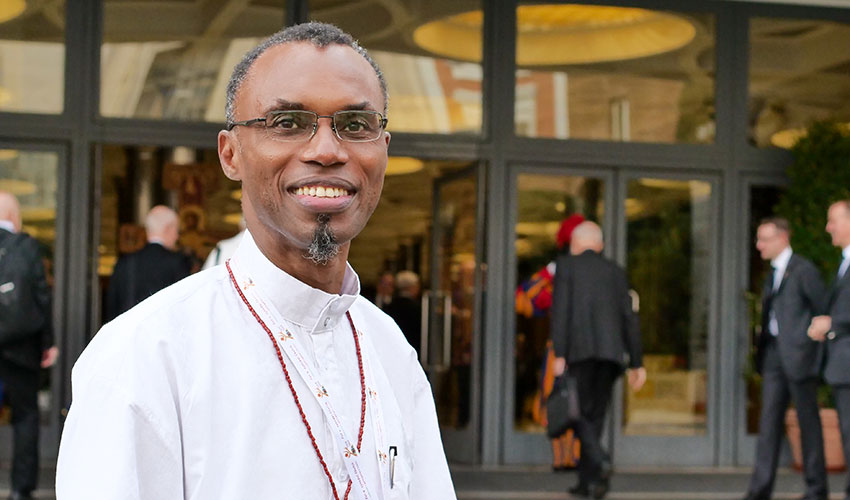The third part of the synthesis report from the first session of the Synod on Synodality calls for—among many things—an ecclesial discernment of open questions in view of becoming a listening and accompanying church. It even notes that these open questions include “controversial” ones on moral and ethical matters, those that have often caused some division in the church (15b, d).
While the report refrains from providing an exhaustive list of questions for discernment, the document indicates the path to follow and identifies available resources. The former includes an open, extensive and inter-disciplinary dialogue. Paramount among the latter are Scripture and the teachings of the church. Common to both is an authentic desire for love anchored in truth and embodied in the life and mission of Jesus Christ.
Specific elements of Jesus’s approach include his non-judgemental receptivity to people’s unique and personal “story and situation.”
Above all, it is the practice and teaching of Jesus that models for us how these questions are to be approached. Specific elements of Jesus’s approach include his non-judgemental receptivity to people’s unique and personal “story and situation” (15e), his preferential option for the poor and marginalized and the transformative power of his one-on-one encounters with people. To imitate Jesus’s example requires both conversion and a willingness to accompany one another, while practicing “some degree of self-emptying” (16c) in order to make room for the other’s personal narrative, which in essence is the meaning of synodality.
The Synod concedes that new questions are arising from these issues for which neither Christian anthropology nor church teaching provide adequate categories for grasping their complexity, probing their meaning and discerning corresponding pastoral imperatives. Although our reflection focuses on what the report calls “identity and sexuality,” we do not want to undermine the importance of the other issues that the Synod highlighted for further study, conversation and discernment.
The avalanche of reactions, both positive and negative, to the declaration “Fiducia Supplicans” lends credence to the priority and urgency of focusing on the particular issue of identity and sexuality. (As an aside, the original Italian language text of the Synod’s report uses the more specific terms “identità di genere e all’orientamento sessuale,” meaning “gender identity and sexual orientation.” See 15b.)
Both heterosexual and homosexual people embody the truth of their dignity as imago Dei in their sexuality.
Both the Document for the Continental Stage and Instrumentum Laboris of the Synod proposed the image of the church as an enlarged tent that welcomes all into the community. In response, various local churches opted to translate this ecclesiological model into their context using local metaphors, like the family, notably in the African context. As some African delegates to the Synod pointed out, the family is a place of hospitality and mutuality. Any attitude of rejection and aggression undermines the nature of the church as the family of God.
Both heterosexual and homosexual people embody the truth of their dignity as imago Dei in their sexuality. The teaching of the church is clear: all people, no matter their sexuality, are loved equally by God. A synodal church listens to their joys and hopes, pain and anguish, in equal measure. Listening is a factor of a recognition of the dignity of all women and men, both heterosexual and homosexual.
It is the antithesis of condemnation and rejection on account of a person’s sexual orientation. The cry of people who are hurt, hunted and harassed on account of their sexual orientation rang loud and clear in the Synod hall, with stories that moved many of the participants.
We may quarrel over how to interpret Scripture or how to understand the church’s teaching on human sexuality, but we cannot deny the reality of same-sex relationships as integral to the meaning of the church as the People of God. In other words, there is no part of the world where we can honestly claim that this reality does not present a real pastoral challenge.
We cannot deny the reality of same-sex relationships as integral to the meaning of the church as the People of God.
The church is home to women and men who desire to live the truth of the Gospel and experience the love of God as heterosexual and homosexual. These women and men have faces, they have names and they have unique personal stories and situations. When our church opts to become a safe space or a family where all are heard with the “respect, compassion and sensitivity” called for by the Catechism (2358), and no one is judged with disdain, we stand on the verge of becoming a truly synodal church.
On the issue of sexuality and identity, we need to adopt Jesus’ attitude of deep listening, not only to the point of view of people whose sexual orientation differs from ours, but also with an unconditional respect for their stories, situations and lives.
One practical suggestion would be for leaders of local churches across the world to engage in dialogue, conversation and collaboration—following the pastoral practice of Pope Francis—with community organizations like Outreach, New Ways Ministry, Dignity, Fortunate Families, the Global Network of Rainbow Catholics and the many other local groups that are committed to the ministry of listening and accompaniment of women and men who feel excluded in the church on account of their sexuality and identity.
It would be truly transformative if the church in local contexts supported these types of ministries by endorsing them as ecclesial ministries of the community and gave visibility and prominence to the vital service that they render to the People of God, as proposed by the Synod (16p).
Indeed, the Synod calls for the church specifically to listen to members of these communities. “When appropriate,” reads the report, “it should also involve people directly affected by the matters under consideration” (15k). In other words, for the church to reflect on matters concerning sexuality and identity means to listen to gay, lesbian, bisexual and transgender people themselves.
For the church to reflect on matters concerning sexuality and identity means to listen to gay, lesbian, bisexual and transgender people themselves.
This means not only listening to what they feel about various church teachings, but listening to their lives: Who is God for them? How do they embody the love of God? What does Jesus mean to them? How is the Holy Spirit at work in their lives? And what is their experience of the church?
In the final analysis, the Synod summons the church to demonstrate a capacity to model Jesus’ own approach of listening and accompaniment, especially towards people relegated to the margins of religious and societal establishments. One such group is the LGBTQ community, whose members are routinely excluded, criminalized and marginalized in many parts of the world in ways that wound their dignity as imago Dei.
A synodal church is a healing church. The path to healing passes through the gates of justice and a firm commitment to uphold the dignity and equality of the children of God.




